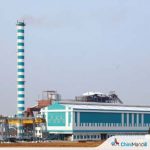Nongpoh: Ri-Bhoi district in Meghalaya is set to make history with the launch of the state’s first Bamboo Park at Mawtnum village. The project, which covers five acres, aims to support sustainable development, create jobs, and position Meghalaya as a leader in bamboo-based industries.
Bamboo is increasingly being recognized as an eco-friendly alternative across various industries. In recent years, the government has also advocated for bamboo’s potential as a sustainable biofuel, particularly for ethanol production. India’s North-East has 55 million tonnes of bamboo, making up 66% of the country’s resources. The National Bamboo Mission, launched by Prime Minister Narendra Modi in 2018, promotes bamboo cultivation to boost farm incomes, fight climate change, and produce bio-ethanol. India’s first 2G-Ethanol Bio Refinery in Assam, the Numaligarh Refinery, has also been set up to convert bamboo into ethanol, benefitting local farmers and boosting the economy.
The foundation stone for the Ri-Bhoi Bamboo Park was laid on Saturday by James PK Sangma, Chairman of the Meghalaya Industrial Development Corporation (MIDC). The event was attended by key figures, including Umsning MLA Dr Celestine Lyngdoh, MIDC Managing Director DD Nongmalieh, Ri-Bhoi Additional Deputy Commissioner MB Tongper, former Mawhati MLA Donbok Khymdeit, and community leaders from Mawtnum village.
James PK Sangma described the project as a significant opportunity for the region. “Bamboo is like ‘green gold’ with the potential to change lives and generate good income. Its true value lies in its ability to be used in a sustainable way,” Sangma said. He highlighted bamboo’s potential to support environmental goals, especially in reducing carbon emissions through products like ethanol and bamboo pellets, which are cleaner alternatives to charcoal and petroleum.
Sangma pointed out that the growing global demand for bamboo and its products could bring new economic opportunities for Meghalaya. “As India moves toward ethanol blending to cut emissions, bamboo’s role will only increase. Meghalaya’s rich variety of bamboo gives it an advantage in this sector,” he said.
The park is intended to be more than just a business hub. It aims to promote new ideas, protect the environment, and create jobs. By moving from traditional charcoal production to bamboo-based products, the project addresses key environmental issues like deforestation and pollution.
The park will have 11 production units for bamboo-based industries, a training centre, and guest houses built entirely from bamboo. The goal is to show how bamboo can be used to meet daily needs while protecting the environment.
Mawtnum village headman, Badhok Nongmalieh, shared his thoughts on the project’s goals. “This park will provide jobs for our youth and farmers while using bamboo’s many benefits. It’s a model for how bamboo can meet daily needs while protecting nature,” he said.
He explained that the project is currently being funded entirely by the village without government help, although he hopes for future support. Highlighting bamboo’s fast growth, Nongmalieh said, “Bamboo can be harvested in two years, unlike trees that take 10 to 15 years to mature. This makes it a sustainable option for wood-based industries.”
Sangma praised the efforts of project leaders Badhok Nongmalieh and Kamai Nongmalieh for their vision and dedication. He also stressed the importance of community involvement in the project’s success. “No industry can succeed without the active support of local communities. The partnership with the community of Mawtnum village serves as a model for others,” he said.
Sangma expressed hope for the project’s long-term benefits for the area. “This project will not only change the economy of Ri-Bhoi district but also set an example for sustainable development in Meghalaya,” he stated.
With its focus on sustainable growth, environmental protection, and job creation, the Ri-Bhoi Bamboo Park is seen as a big step toward a greener economy in Meghalaya. The project’s emphasis on community participation and sustainable practices has already earned praise as a model for other regions to follow.












